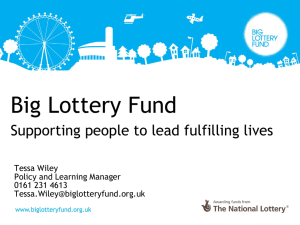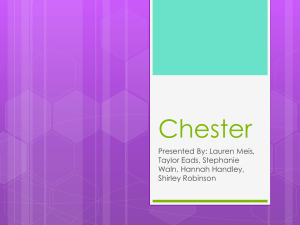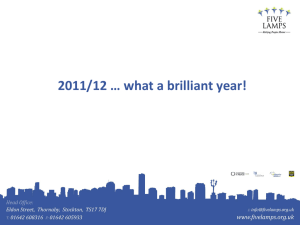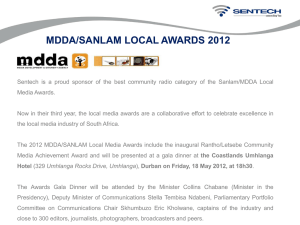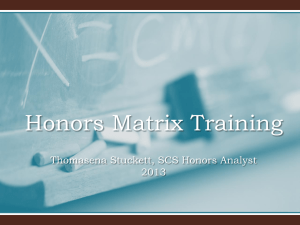The Chester County Science Research Competition (CCSRC)
advertisement
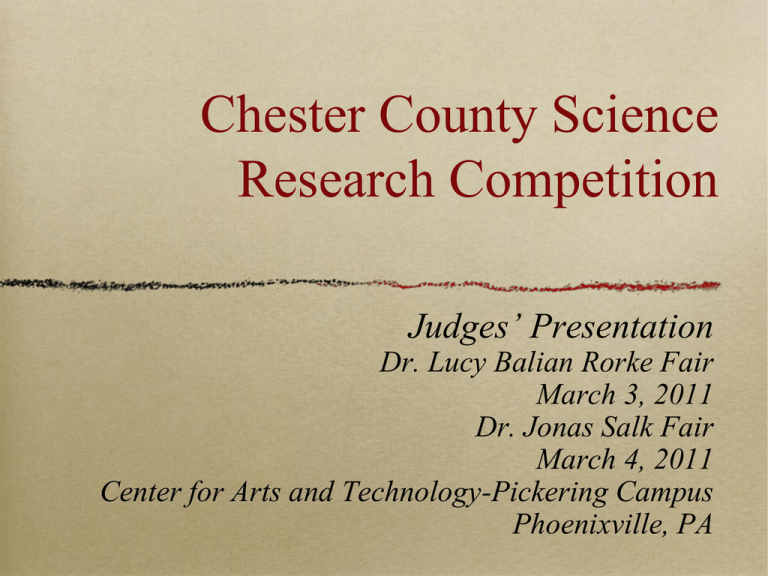
Chester County Science Research Competition Judges’ Presentation Dr. Lucy Balian Rorke Fair March 3, 2011 Dr. Jonas Salk Fair March 4, 2011 Center for Arts and Technology-Pickering Campus Phoenixville, PA CCSRC Mission Statement The Chester County Science Research Competition is dedicated to encouraging, supporting and developing scientific inquiry and discovery through individual and team science projects conducted by elementary, middle and high school students. We believe that students are the foundation of our nation’s future. Their understanding and accomplishments in science and technology will prepare them to become the leaders of tomorrow and successful citizens in our technologically advancing society. We believe: The Chester County Science Research Competition (CCSRC) sponsored by the Chester County Intermediate Unit, provides an opportunity for students to pursue inquiry-based science through problem solving, planning and conducting research investigations, and using appropriate tools to gather and analyze data. CCSRC Mission Statement Inquiry-based science is an integral part of science education supported by both the National Science Education Standards and the Pennsylvania Science and Technology Standards. Students involved in scientific investigations exemplify the true nature of science. Through the utilization of the rules established by the Society for Science and the Public for the Intel International Science and Engineering Fair, we provide a safe and flexible learning environment that promotes creativity, investigation and critical thinking. The Chester County Science Research Competition also provides an opportunity for students to present their projects to professional educators and scientists and communicate the results of their investigations at local, regional, national and international competitions. CCSRC Mission Statement Specifically, the CCSRC recognizes and honors participating students from all Chester County schools at an annual regional science fair. We also provide an opportunity for finalists from the Chester County Science Research Competition to compete at the Delaware Valley Science Fairs (DVSF). For those students who are successful at the DVSF, a trip awaits to the Intel International Science and Engineering Fair (ISEF). It is our belief that the Chester County Science Research Competition and its affiliated fairs encourage students to pursue careers in science, technology, mathematics, and/or engineering by providing a forum for developing academic skills, conducting independent scientific investigation, writing research papers, speaking, preparing an organized display, and utilizing the processes and tools of science. CCSRC Philosophy All students deserve the utmost respect and admiration from the CCSRC staff and judges. All projects represent the best science projects entered by students in their respective school fairs. All students are to be commended for successfully completing a new, challenging and sometimes difficult process to reach this level of competition. For many students, this is their first venture into an academic event outside their school; our goal is to make this a positive and meaningful experience. It should be presumed that all students have done their own work. Teacher, parent and/or professional assistance is permitted and encouraged. Who Are These Young Scientists? The students at our fair represent the next generation of young people who will become our scientists, researchers, health care and technology-based workers in our society. Each student has competed at a local fair and their work was selected as a top ten project from their school. Students participating in the Salk Fair are 9 or 10 year olds and are from grades 4 or 5. Students participating in the Rorke Fair are 11 to 18 years old and represent grades 6 to 12. They look up to you and respect your role as an expert in science. Students are excited to be attending the fair and will be very nervous during the interview. They will be sensitive to your demeanor, tone of voice, the interest you have in their project, the number of times they are interviewed and the amount of time you spend discussing their project with them. Children are very intuitive. The positive impact you have on them during the interview will likely be remembered for a lifetime. What To Expect Each student should be able to speak authoritatively about his or her project. All projects should demonstrate the use of an inquiry-based investigation. Where applicable, the scientific method should have been used. Mathematics, engineering and computer projects may not demonstrate the scientific method. In mathematics, engineering, and computer science, a systemic approach to problem solving should be evident. Begin your interview with a friendly greeting and introduction. Some students will tell you everything about their projects. Others will need gentle prompts from you or the team to bring out the information. Project boards should have data displays. Reference them during the interview to determine if the student understands the data. Try to determine the depth of the student’s understanding about the scientific concepts and principals underlying their investigations. Judging Teams All judges will work in teams of two or more judges. Your judging will occur in two parts: The morning will be reserved for interviewing the students. The afternoon will give you time to more carefully analyze the student’s work and discuss the merits of the project with fellow judges without the students being present. You will be selecting the top three projects in each category and any projects that deserve an honorable mention. It is important that students are interviewed, at least, twice. You can either split your team and work individually or you can return to each project as a team to do some additional in-depth questioning. Take notes using the judging forms as a guide for your evaluation of each project. During the afternoon, you will complete an official judging form. Each judging form must have, at least, an equal representation of strengths and weaknesses. A few hand written notes of encouragement for the student are always appreciated. These forms will be returned to the students after the fair. Please be fair, honest and kind. What Should I Find at Each Project? A very excited and nervous student who is eager to put their best foot forward A project board with the following items, a(n): title in question form hypothesis materials list procedure data charts, pictures, graphs, etc. conclusion abstract student log or journal Do not expect to find working models, plants, chemicals, or other manipulatives. These are not required and some are not permitted. How Do I Evaluate the Project Board? Things to look for include: Neatness, accuracy and organization are evident on the display board. The steps of the scientific method are utilized to investigate the student’s idea. (For most projects. However, engineering, computer and math projects may not exhibit the scientific method) The use of graphs, charts, pictures and other visuals are used to display data collected during the investigation. A log book or journal that demonstrates the student’s effort in completing the project. (Does not have to be neat!) A one page abstract that clearly summarizes the student’s work and understanding of the project. Suggested Questions for Judging Projects Where did you get your idea for your science project? What were you hoping to learn by doing this project? What did you learn by doing this investigation? Did you find any unexpected data or results? What aspects of your project did you find most interesting? Did you encounter any difficulties and how did you resolve them? What would you do differently if you were doing this project again? How could you extend this project? Have you gotten any new ideas by doing this project? Rorke Fair Awards Rorke Fair awards are given in four groups: first, second, third and honorable mention. Only one project in each category and grade level can receive a first, second and third. Honorable Mention may be given to twenty percent of the projects in each category and grade. In addition to your work, there is a second tier of judging that occurs. A small team of special awards judges selects the three Best of Show projects for grades 6-8, 9, 10, 11, and 12. For the Rorke Fair, the Best of Show Awards will be selected from all of the 1st Place projects. To accomplish this, it is important that we know who your 1st place winner is for the category(ies) you are judging. Please list the category, project name and project number on the 1st Place Award form in your packet and give it to a fair official as early as possible, but not later than 2:00. You can then go back to decide on the 2nd, 3rd place and Honorable Mention winners. Other special awards are given to projects that, while they may not be exemplary, exhibit some creative effort, interesting perspective or other unique characteristic that deserves recognition. Please submit the category, project name and project number to us for consideration by our special awards judges for other recognition on the Special Awards form. Salk Fair Awards Salk Fair awards are given in three groups: Distinguished Honors, High Honors, and Honors. Ten percent of the projects in each category may be awarded the first three awards. For example, if there are ten projects in a category, you may give one Distinguished Honors, one High Honors, and one Honors. Please note that you have some flexibility here if you feel that two or three projects should share an award. In addition to your work, there is a second tier of judging that occurs. A small team of special awards judges selects the three Best of Show projects for grades 4-5. For the Salk Fair, the Best of Show Awards will be selected from all of the Distinguished Honors projects. Please list the category, project name and project number on the Distinguished Honors Award form in your packet and give it to a fair official as early as possible, but not later than 2:00. You can then go back to decide on the High Honors and Honors winners. Other special awards are given to projects that, while they may not be exemplary, exhibit some creative effort, interesting perspective or other unique characteristic that deserves recognition. Please submit those project categories, project names and project numbers to us for consideration by our special awards judges for other recognition on the Special Awards form. With Deep Appreciation On behalf of the children and future scientists of Chester County, the Chester County Intermediate Unit and the staff of the Chester County Science Research Competition, would like to extend our sincere appreciation to you for your dedication, time and expertise in helping to make our fair a success. • Mary Jeanne Curley Director of Public Relations • Jennifer L. Fraim Coordinator of Special Events • Katherine A. Pettiss CCSRC Advisor • David D. Jarvie CCSRC Director
